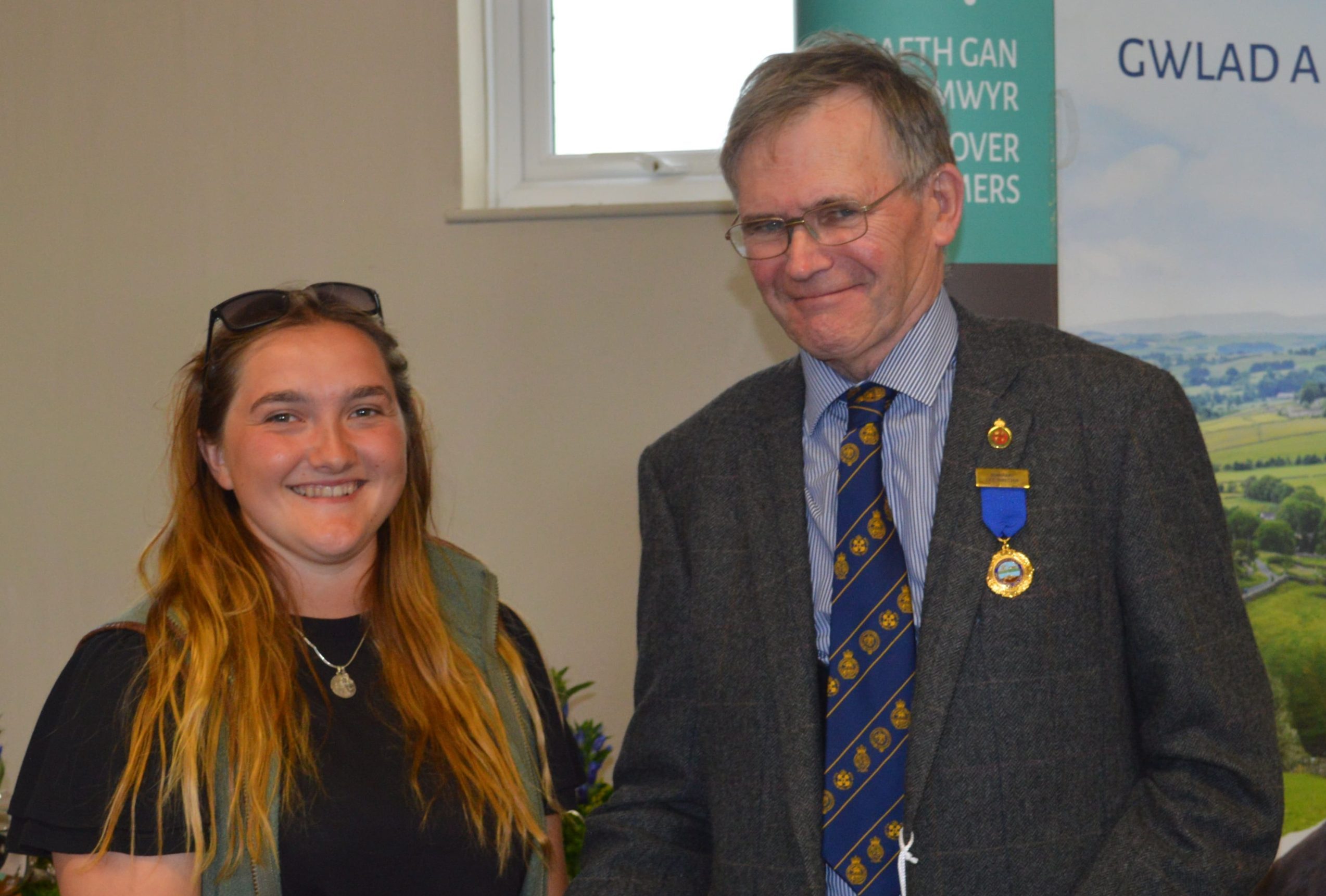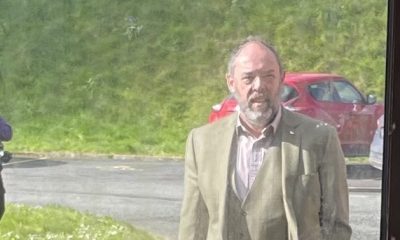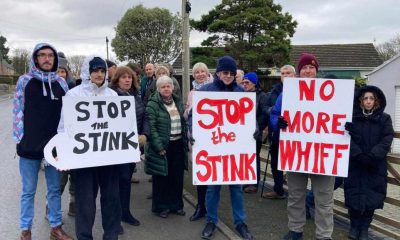Farming
Brexit to cost Welsh farmers

‘Wales must not lose a penny’: Carwyn Jones
£200M a year: that’s the support given to 16,000 Welsh farms through the Common Agricultural Policy.
In last Thursday’s (Jun 23) momentous vote to exit the EU, Welsh voters decided that Welsh farmers would need to find that level of subsidy from elsewhere. The question remains as to where that money will come from, especially with all those brand new hospitals promised by Leave campaigners waiting to be built.
NO RAPID EXIT
Expressing disappointment with the referendum result, Glyn Roberts from the FUW welcomed the Prime Minister’s decision to delay invoking Article 50 of the Treaty of Lisbon.
Mr Roberts said the timescale of an exit was crucial to such planning, and that exit over too short a period would have dire consequences for both the UK and the EU.
“There is a monumental amount of work to do in terms of changing domestic arrangements and legislation, including in terms of Welsh devolved legislation, not to mention unravelling us from the EU budget to which we were previously committed, negotiating trade deals and dealing with issues such as border controls. “Such issues will also require a huge amount of work at the EU level, and we do not believe a rapid exit over a couple of years would be in either the UK or the
EU’s interests.
“It is likely to leave everyone with the worst of all worlds,” he added.
The Union has called for early
meetings with the Welsh Government and is also engaged with UK Government to ensure that the voice of Welsh farming is heard during these challenging times.
“We have also reached out to other non-member states in order to better understand agricultural models in countries such as Norway and Switzerland, and these knowledge exchanges will ensure that the experience of other nations can benefit any plans being developed in Wales,” said Mr Roberts, who concluded: “Our members’ voices must be heard, so we will consult with them as widely as we can to ensure that Wales gets what it needs to ensure a sustainable agricultural future and stronger rural economies.”
IMPLICATIONS UNCLEAR
NFU Cymru President, Stephen James, said, “At the forefront of most farmers’ minds will be the twin questions of what level of access we will enjoy to the European markets and what level of support farmers in Wales might receive once the withdrawal process is complete. We must ensure we have the best possible access to Europe’s markets and an agricultural policy that guarantees parity of treatment with the rest of Europe. If farm businesses are to plan for the future then they need to know the answers to these questions sooner rather than later.
“Negotiating and concluding trade agreements with the European Union and the rest of the world for our exports now becomes vital. Wales is particularly reliant on export markets and we will be looking to the UK Government to
prioritise the negotiation of favourable trade agreements. Whilst doing so, I would stress that it is essential that decision makers do not undermine domestic agriculture by opening the UK market to goods which do not meet our own high standards of production.”
Reflecting on the timing of the end of CAP support, Mr James pointed out: “Once official notification is made, the two year window we have for exiting leaves little time to conclude our withdrawal from the EU, whilst simultaneously seeking to negotiate trade deals from scratch. We are urgently seeking a meeting with the Cabinet Secretary to discuss the implications for Welsh agriculture.”
MARKETS MUST BE MAINTAINED
Commenting on the result of the referendum to leave the European Union, the Chairman of Hybu Cig Cymru (HCC)
– Meat Promotion Wales – Dai Davies said: “Hybu Cig Cymru’s focus remains on securing the best deal for levy-payers, and a sustainable future for the Welsh red meat industry.
“The result will undoubtedly lead to a period of uncertainty; HCC has an important role to play in mitigating any instability and ensuring the maintenance of current trade.
“Our essential task in the long-term is securing the best trading deals for Wales
– maintaining our existing export markets in Europe, and continuing our work in developing new trading relationships further afield.
“The First Minister has this morning
outlined six priorities for Wales. HCC will play an active role in finding solutions to these key issues which are in the best interests of the red meat industry. These include the terms of access to the European single market, the future of participation in existing CAP and RDP programmes, and the future of PGI certification.”
WALES MUST NOT LOSE A PENNY
Responding to the Referendum, Welsh First Minister, Carwyn Jones, said: “The Welsh Government must play a full part in discussions about the timing and terms of UK withdrawal from the EU. Our participation is essential, not just for directly devolved issues, but for the whole range of issues affecting vital Welsh interests.
“It is vital that the United Kingdom negotiates to retain access to the 500 million customers in the Single Market. We should negotiate continued participation, on current terms, in major EU programmes like CAP and Structural Funds up until the end of 2020. This will facilitate continuity for citizens, communities, businesses and investors while arrangements are made for the longer term.
“Wales is a net beneficiary from the EU to the tune of hundreds of millions of pounds. There is now an overwhelming case for a major and immediate revision of the Barnett Formula taking into account needs arising from EU withdrawal and I call today for the promise made that Wales will not lose a penny to be guaranteed.”
AGRICULTURE VITAL TO WELSH ECONOMY
The concern about the financial
Consequences of the Leave vote is borne
Out by the fact that, before EU subsidies, the support offered to farmers by successive UK governments were not enough to compensate for the disadvantage Welsh agriculture experienced from its smaller average farm size.
According to NFU Cymru President
, Stephen James: “Agriculture is a significant contributor to the Welsh economy with 60,000 people employed either full or part-time on holdings in Wales. Welsh agriculture has a gross output of nearly £1.5bn and underpins a food supply chain worth £6bn annually, employing 230,000 people or 18% of our workforce. It is essential that this is not put at risk.”
Glyn Roberts, FUW President, said: “All the businesses that make the wheel of our rural economy go round have an important role to play in our daily lives and indeed how we all survive and make a living.
“We know that a lot of second and third sector businesses are already struggling as a result of the knock on impact of low agricultural incomes and farm gate prices, and the potential wider impact if there was to be a further downturn in farm incomes could be catastrophic.
“We must remember that agriculture is the powerhouse of the rural economy, and generates billions of pounds which benefit a host of industries including many not directly associated with agriculture.”
LABOUR MARKET CONCERNS
Currently, 65% of agricultural workers are non-UK EU citizens. In addition, approximately 80% of seasonal workers employed in agriculture are sourced from the EU, due to UK workers being reluctant to take on such short-term, uncertain
employment. Significant numbers of EU workers are also employed in leisure and tourism. This could result in labour shortages and/or price increases for the sector as it is forced to take on alternative, more expensive, labour.
Free movement of EU nationals across the EU will no longer apply to the UK, unless this arrangement continues as part of a renegotiated trading arrangement between the UK and the EU. A change to these rules would mean that the existing pool of labour for UK rural businesses will be significantly reduced.
Meurig Raymond, the Pembrokeshire farmer who heads the NFU reflected concerns about those issues, remarked following the vote: “During the Referendum we have repeatedly drawn attention to our sector’s need for access to non-UK labour, both seasonal and full-time. Outside the EU we will need a student agricultural workers scheme, which is open to students from around the world.
“We will be looking for guarantees that the support given to our farmers is equal to that given to farmers in the EU, who will still be our principal competitors.”
EARLY GUARANTEE NEEDED
The Tenant Farmers Association has also contacted the UK and Welsh governments in the wake of the referendum results. TFA Chief Executive, George Dunn, said, “Agricultural policy will be the main focus of activity for the TFA, and having already set out a potential draft policy for the situation within which we now find ourselves, we will be using that as a basis for beginning our discussions with the English and Welsh Governments to gain early traction to ensure that the farming community is not forgotten as we build new, domestic policies from the bottom up.”
In a statement on Friday morning (Jun 24) organic farming charity ‘ The Soil Association ‘ said it is ‘very disappointed’ by the vote, saying environmental conservation and protection will likely be much more difficult to achieve outside the EU. The Association statement adds: “UK wildlife, the environment and the organic farming sector have been major beneficiaries of EU membership, where the precautionary principle prevails in policy making. Thanks to EU policy, the UK has cleaned up its act as ‘the dirty man of Europe’ and now has cleaner beaches, rivers and better protection for wildlife, including our vital pollinators as a direct result of EU membership. It is vital that these gains are secured.”
The organisation has pledged to work with the government to develop new policy and solutions, saying: “Those communities who are most vulnerable such as those on low incomes and upland farmers need to be foremost in our minds as we consider what policies should be developed over the next couple of years.”
CLA Chief Executive Ross Murray said: “There are some urgent decisions for Ministers to make. These decisions are necessary to secure the immediate future of the rural economy. We need an early guarantee that, whatever happens with regard to the negotiations on the UK’s exit, the support that is currently provided to UK farmers and the wider economy through the EU Common Agricultural Policy (CAP) will continue unbroken and unchanged until at least the end of December 2020.
“As negotiations begin on trade relationships to succeed our position as a full member of the European Union, Ministers must have the needs of farming and other rural businesses at the front of their minds. The ambition must be a barrier and tariff-free relationship. Whatever happens, the UK Government must not allow a poor trade dynamic that leaves UK agriculture at a disadvantage.
“Discussions must begin as soon as practical on what will replace the support provided through the CAP. A dedicated UK Agriculture and Land Use Policy must be in place ready for the day we exit the European Union. This has to be a widely accepted policy that supports our farmers, helping them to be resilient to unpredictable markets, and providing them with a firm foundation to compete with EU and other farmers from across the world. It must also be a policy that fully supports the vital work of managing our land and wildlife, preserving our landscapes and supporting rural communities.”
FARM INCOMES UNDER THREAT
It is probable that the UK will now have to renegotiate terms of trade agreements previously concluded by the EU. To what extent and on what terms non-EU countries will be willing to establish trade agreements direct with the UK remains to be seen. Existing tariffs imposed on goods and commodities coming into the UK from outside the EU would be significantly reduced if default World Trade Organisation rules were applied without the UK adopting its own tariff regime. This could result in cheaper imports undercutting the UK’s primary producers.
The UK will certainly have to negotiate new trading terms with the European Single Market and the level of tariffs to be levied on goods imported into the EU from the UK could be significant for many in the agricultural sector. The EU currently levies significant tariffs on many food products coming into the single market, so this could have a negative effect on the sector unless the UK is able to negotiate beneficial terms.
On average, 55% of farmers’ incomes are currently received by direct subsidies via the CAP. No guarantees have been given about what, if anything, will replace this post-Brexit – although it is generally accepted that some form of alternative subsidy regime will be introduced. The fear is that the general public will balk at matching the expenditure of £3bn currently received from the EU each year, so farmers may find that their incomes are reduced. This could result in many going out of business. It is also probable that subsidies in the future will be more tied to environmental schemes and credentials.
The current uncertainty around use of glyphosate and neonicotinoids would arguably be removed as UK farmers are given the freedom to use products that membership of the EU might prevent. However, if the UK wishes to continue exporting to the EU single market, it may find itself restricted in its freedom to use these products as part of the terms of any trade agreement entered into.
If the withdrawal of EU funding reduces farm budgets and prices for domestic food products fall to compete with imports, returns for in hand farmers and landlords are likely to be hit.
During the campaign, Andrew RT Davies, the Welsh Conservative leader who backed Brexit, said there was a ‘solid guarantee that Welsh farmers would continue to receive at least as much in terms of support ‘. That cheque is, however, not Mr Davies’ to write; and the thing with ‘guarantees’ is that they often come with the sort of strings attached that render them effectively valueless.
employment. Significant numbers of EU workers are also employed in leisure and tourism. This could result in labour shortages and/or price increases for the sector as it is forced to take on alternative, more expensive, labour.
Free movement of EU nationals across the EU will no longer apply to the UK, unless this arrangement continues as part of a renegotiated trading arrangement between the UK and the EU. A change to these rules would mean that the existing pool of labour for UK rural businesses will be significantly reduced.
Meurig Raymond, the Pembrokeshire farmer who heads the NFU reflected concerns about those issues, remarked following the vote: “During the Referendum we have repeatedly drawn attention to our sector’s need for access to non-UK labour, both seasonal and full-time. Outside the EU we will need a student agricultural workers scheme, which is open to students from around the world.
“We will be looking for guarantees that the support given to our farmers is equal to that given to farmers in the EU, who will still be our principal competitors.”
EARLY GUARANTEE NEEDED
The Tenant Farmers Association has also contacted the UK and Welsh governments in the wake of the referendum results. TFA Chief Executive , George Dunn , said, “Agricultural policy will be the main focus of activity for the TFA , and having already set out a potential draft policy for the situation within which we now find ourselves, we will be using that as a basis for beginning our discussions with the English and Welsh Governments to gain early traction to ensure that the farming community is not forgotten as we build new, domestic policies from the bottom up.”
In a statement on Friday morning (Jun 24) organic farming charity ‘ The Soil Association ‘ said it is ‘very disappointed’ by the vote, saying environmental conservation and protection will likely be much more difficult to achieve outside the EU. The Association statement adds: “UK wildlife, the environment and the organic farming sector have been major beneficiaries of EU membership, where the precautionary principle prevails in policy making. Thanks to EU policy, the UK has cleaned up its act as ‘the dirty man of Europe’ and now has cleaner beaches, rivers and better protection for wildlife, including our vital pollinators as a direct result of EU membership. It is vital that these gains are secured.”
The organisation has pledged to work with the government to develop new policy and solutions, saying: “Those communities who are most vulnerable such as those on low incomes and upland farmers need to be foremost in our minds as we consider what policies should be developed over the next couple of years.”
CLA Chief Executive Ross Murray said: “There are some urgent decisions for Ministers to make. These decisions are necessary to secure the immediate future of the rural economy. We need an early guarantee that, whatever happens with regard to the negotiations on the UK’s exit, the support that is currently provided to UK farmers and the wider economy through the EU Common Agricultural Policy (CAP) will continue unbroken and unchanged until at least the end of December 2020.
“As negotiations begin on trade relationships to succeed our position as a full member of the European Union, Ministers must have the needs of farming and other rural businesses at the front of their minds. The ambition must be a barrier and tariff-free relationship. Whatever happens, the UK Government must not allow a poor trade dynamic that leaves UK agriculture at a disadvantage.
“Discussions must begin as soon as practical on what will replace the support provided through the CAP. A dedicated UK Agriculture and Land Use Policy must be in place ready for the day we exit the European Union. This has to be a widely accepted policy that supports our farmers, helping them to be resilient to unpredictable markets, and providing them with a firm foundation to compete with EU and other farmers from across the world. It must also be a policy that fully supports the vital work of managing our land and wildlife, preserving our landscapes and supporting rural communities.”
FARM INCOMES UNDER THREAT
It is probable that the UK will now have to renegotiate terms of trade agreements previously concluded by the EU. To what extent and on what terms non-EU countries will be willing to establish trade agreements direct with the UK remains to be seen. Existing tariffs imposed on goods and commodities coming into the UK from outside the EU would be significantly reduced if default World Trade Organisation rules were applied without the UK adopting its own tariff regime. This could result in cheaper imports undercutting the UK’s primary producers.
The UK will certainly have to negotiate new trading terms with the European Single Market and the level of tariffs to be levied on goods imported into the EU from the UK could be significant for many in the agricultural sector. The EU currently levies significant tariffs on many food products coming into the single market, so this could have a negative effect on the sector unless the UK is able to negotiate beneficial terms.
On average , 55% of farmers’ incomes are currently received by direct subsidies via the CAP. No guarantees have been given about what, if anything, will replace this post-Brexit – although it is generally accepted that some form of alternative subsidy regime will be introduced. The fear is that the general public will balk at matching the expenditure of £3bn currently received from the EU each year, so farmers may find that their incomes are reduced. This could result in many going out of business. It is also probable that subsidies in the future will be more tied to environmental schemes and credentials.
The current uncertainty around use of glyphosate and neonicotinoids would arguably be removed as UK farmers are given the freedom to use products that membership of the EU might prevent. However, if the UK wishes to continue exporting to the EU single market , it may find itself restricted in its freedom to use these products as part of the terms of any trade agreement entered into.
If the withdrawal of EU funding reduces farm budgets and prices for domestic food products fall to compete with imports, returns for in hand farmers and landlords are likely to be hit.
During the campaign, Andrew RT Davies, the Welsh Conservative leader who backed Brexit, said there was a ‘solid guarantee that Welsh farmers would continue to receive at least as much in terms of support ‘. That cheque is, however, not Mr Davies’ to write; and the thing with ‘guarantees’ is that they often come with the sort of strings attached that render them effectively valueless.
Farming
Pembrokeshire Agricultural Society in search for county’s top progressive farmers

IF you farm in Pembrokeshire and can demonstrate your farm’s use of the latest technological methods to promote progressive, sustainable agriculture then the Pembrokeshire Agricultural Society encourage you to enter the prestigious Baron de Rutzen Award.
Adam Thorne, Pembrokeshire County Show President, said, “We are looking for local Pembrokeshire farmers, under the age of 45, who can demonstrate their farm’s use of the latest technological methods to promote progressive, sustainable agriculture. They also need to show consideration for the environment and habitat sensitivity on their farm as well as present an aesthetically pleasing example of farming in the county. The competition welcomes all livestock and arable sectors to take part.”
Last year’s winners of the Award were Mark and Caroline Davies of Little Newcastle, Haverfordwest. They milk 230 pedigree Holsteins through a fully automated system. They rear their own replacements and also have a small beef enterprise. The farm is all grassland and they follow a strict reseeding and liming policy to optimise the yield from their multi-cut silage system. The couple place significant emphasis on animal health, husbandry and breeding to maximise the efficiency of their system.
Baron John Fredrick De Rutzen was President of Pembrokeshire Agricultural Society in 1936 and the Baron de Rutzen Trophy was produced in his memory. The third Baron served in the Welsh Guards and tragically died, aged 36, in 1944.
This year’s entrants must be fully practising farmers within the county of Pembrokeshire and were under the age of 45 years on 1 January 2024. Entries can either be by nomination or direct application online on the Pembrokeshire Agricultural Society website. Click here to apply: Baron de Rutzen Award | Pembrokeshire County Show | Pembs Agricultural Society (pembsshow.org)
The closing date for nominations and applications is at noon on Wednesday, 29 May 2024.
Farming
Pembrokeshire Agricultural Society elect new president

ARABLE and beef farmer, Adam Thorne, has been unanimously elected to become the new President of Pembrokeshire Agricultural Society for the year ahead. Adam is the third generation of his family to hold the position.
During the Annual General Meeting of Pembrokeshire Agricultural Society, held last week on the Pembrokeshire Showground, Mr Tim John and his wife Margaret John were also voted in as Presidents elect.
Adam Thorne has had a long association with Pembrokeshire Agricultural Society. After visiting the show as a toddler, then helping show the family’s pedigree Herefords, his uncle got him into helping him with stewarding in his early teens. From there he progressed to being a Steward with his own section, Commercial Cattle, and then also the Butcher’s Lambs section.
From stewarding, Adam became involved with committee work, starting as an Executive and then on to the former Finance and General Purposes Committee. He has been Chairman of the Estates Committee for 12 years and is now a Board member and a Trustee.
Adam said, “I am proud of my long association with Pembrokeshire Agricultural Society. I am the third generation to now be President, following my late grandfather, Walter Thorne, my father, Robert Thorne and more recently my uncle, George Thorne. I am looking forward to my year in the prestigious position.”
Away from his work with the society, Adam runs the family’s arable and beef farm in Robeston West, Milford Haven. He has been heavily involved with Tiers Cross YFC from an early age, having been Club Secretary twice and Chairman. He has also sat on Pembrokeshire County YFC Committees and the Wales YFC Rural Affairs Committee.
The 2024 Pembrokeshire Agricultural Society officeholders, announced at the AGM, include Miss Ffion Edwards who was awarded the role of Ambassador at last year’s show. Ffion, a nurse from Maenclochog, has enjoyed many years of attending the county show and believes that there are so many good elements to it. Ffion has been a member of Llysyfran YFC for 15 years and enjoys every aspect of young farmers – trying new experiences, competing and travelling to name a few. Mrs Nicola Owen was also elected as the Honorary Treasurer.
Brian Jones, the outgoing Pembrokeshire Agricultural Society President, took the opportunity to thank everyone who had helped and supported him throughout his presidency. During his year as President, Brian and his wife Helen, raised a tremendous amount of money for various charities including the Pembrokeshire Agricultural Society, RABI, Tir Dewi and the DPJ Foundation. Brian also gave his assurances that Castell Howell will continue to sponsor the Food Hall for future years.
Pembrokeshire County Show, the largest county agricultural show in Wales, will be held over two days again this summer on 14 and 15 August. Everyone is invited to attend the celebration of rural life in the county.
Pictured (left to right): Ffion Edwards the Ambassador for 2024; Adam Thorne, President; Margaret and Tim John, the Presidents Elect.
Farming
£1,000 bursary award available to Pembrokeshire agricultural students

PEMBROKESHIRE Agricultural Society’s £1,000 Bursary Award is now open for applications from students studying agriculture, veterinary science, agricultural engineering, food technology, forestry or other subjects allied to agriculture.
The Student Bursary Award 2024 is available to students, from Pembrokeshire, who are currently studying or have been accepted to start their studies. They can apply for this financial support to assist with their chosen college or career path.
Last year’s winner of the award was Lottie Wilson from Hayscastle. Lottie was studying agriculture at the University of Nottingham when she applied for the bursary. When she is at home she is a general dairy farm worker as well as a lambing hand and a calving beef herd assistant. In 2021 she was the top agriculture student at Hartpury College.
Robert James, Chairman of the Society’s Bursary Committee said, “I would urge all Pembrokeshire students who study subjects that are clearly aligned to agriculture to apply for this bursary as it won’t only assist with your studies but will also give you great experiences such as undertaking an interview which is a key employment skill. It will also assist in your future career within the agriculture industry.”
“A panel of independent judges will draw up a short list of candidates who will be interviewed and the winning candidate will be asked to give a short presentation at a future meeting of the society’s show council.
“The standard of applications has always been exceptional which gives a lot of heart that there are a lot of very talented young people in our community. We are very much looking forward to receiving applications for this year’s bursary and hearing from the younger generation.”
Qualifying students must not have won the student bursary on a previous occasion, the applicant must be studying or has been accepted to study agriculture or allied subjects at a UK college or university at A-Level or higher and the applicant’s family home must be in Pembrokeshire.
The bursary is tax free and will be awarded to the student who, in the opinion of the panel of judges, has submitted the best dissertation on how the bursary will assist them to complete their course of study.
Further details and the entry form can be found online: Student Bursary Award | Pembrokeshire County Show | Pembs Agricultural Society (pembsshow.org) or by calling the show office: 01437 764331. The closing date for applications is noon on Monday, 1 July 2024.
-

 Crime7 days ago
Crime7 days agoFormer Pemb Dock mayor accused of making child abuse images
-

 Community2 days ago
Community2 days agoThe Harbourmaster: Special rail excursion draws crowds to Milford Haven
-

 News22 hours ago
News22 hours agoDragon LNG ‘monitoring’ scrap car blaze in Waterston
-

 Crime6 days ago
Crime6 days agoDock duo sentenced for Aldi meat theft
-

 Crime6 days ago
Crime6 days agoMechanic lands four-figure fine after head-butting officer in Quins
-

 News2 days ago
News2 days agoSearch for Luke, 19, reported missing in the Pembroke Dock area, continuing
-

 News3 days ago
News3 days agoMajor search in the area of The Cleddau Bridge and Hobbs Point
-

 Business7 days ago
Business7 days agoMilford Waterfront major events partnership with Round Table























